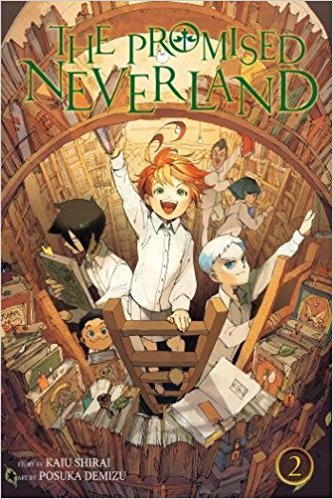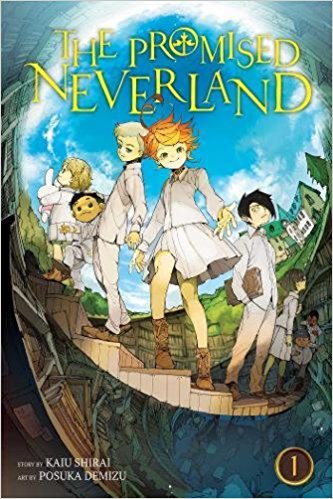By Kaiu Shirai and Posuka Demizu. Released in Japan as “Yakusoku no Neverland” by Shueisha, serialization ongoing in the magazine Weekly Shonen Jump. Released in North America by Viz Media. Translated by Satsuki Yamashita.
(As with previous volumes, and likely going forward, these reviews spoil the volume in question. Because that’s exactly what reviews are for.)
I keep waiting for the moment that The Promised Neverland slows down to catch its breath a bit, but it’s become clear by the end of this third volume that that’s never going to happen. Our heroes plot, scheme, learn who to trust and who to betray, get trusted and betrayed, and by the end of the book everything is in ruins. It can honestly be a bit exhausting, and it’s definitely terrifying – there’s some real chilling horror reading this series – but it’s also completely exhilarating, and I want to see these kids succeed. Somehow. Even if what they escape to may end up being even worse. That said, I may not get my wish for a bit, as by the end of this book their plan is up in smoke, Mom knows all, Emma’s got a broken leg, and Norman’s getting shipped out to be delicious. There’s a lot going on.
Despite the presence of most of the orphans on the cover, this is very much a cast of five vs. the world, as Don and Gilda, after a tense discovery and angry confrontation, join forces with our heroes. I enjoyed all of the back and forth with Norman and Ray try to outdo Vizzini in figuring out what Mom and Sister Krone are actually up to, and how they can escape. I also like how they ultimate fail (at least so far) – a lot of clever kids think they’re being super secretive and canny when it turns out Mom has known what they’re thinking all along, and that’s what we get here, and it doesn’t take away from their extreme cleverness. I loved them looking at the books, where they understand some but not all of the code, and Emma’s intuition knowing they’re important but now quite why they’re important.
And then there’s the fall of Sister Krone, as well as her backstory. Despite Norman wondering how much of what she revealed to them was true and how much was false, I’m inclined to believe most of her backstory, especially as we get more flashbacks to it in her final moments. Despite functioning very effectively as a pure force of terror a lot of the time, particularly at the start of this volume, by the end of it all you feel is sad, as well as realizing what horrible monsters we have on “the outside”. Her revelation on how “moms” get chosen is also rather interesting, and makes me wonder if someone from Field House (not Emma, I suspect, but maybe Gilda) was being groomed for a position. That said, Sister Krone was correct – she could try to be scarier and more cunning than Isabella, but in the end there’s only one mom here.
So what’s next? Is this the sort of series that’s prepared to kill off its main cast? What about the rest of the orphans that Emma wants to save? And what *is* going on outside? This is a scary, scary volume, but I desperately want to read more. Highly recommended.





